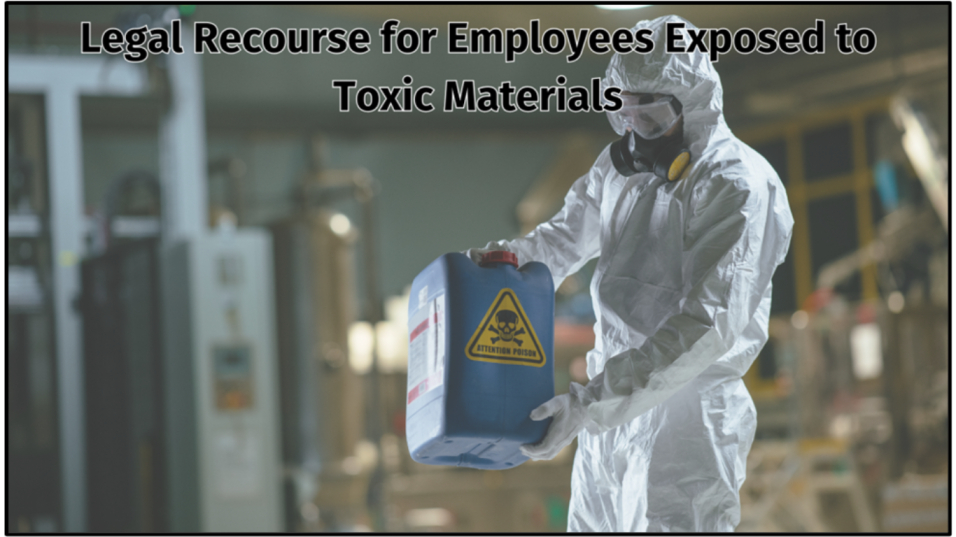If you’re an employee who has been exposed to toxic materials in the workplace, it’s essential to understand your legal rights and the options available to you. Exposure to toxic materials in the workplace can lead to severe health consequences for employees, ranging from respiratory issues to life-threatening illnesses such as cancer.
In this blog post, we will explore the various legal options available to employees who have been exposed to toxic materials in the workplace.
Toxic Exposure in the Workplace
Toxic exposure can occur in various industries, including manufacturing, construction, healthcare, and agriculture. Some common examples of toxic materials that employees may encounter include:
- Asbestos
- Lead
- Benzene
- Pesticides
- Solvents
Exposure to these substances can happen through inhalation, skin contact, or ingestion, and the effects may not be immediately apparent, sometimes taking years to manifest.
Recognizing the Signs and Symptoms of Toxic Exposure
Employees should be aware of the potential signs and symptoms of toxic exposure, which can vary depending on the substance and the duration of exposure. Some common indicators include:
- Respiratory issues, such as coughing, wheezing, or shortness of breath
- Skin irritation, rashes, or burns
- Eye irritation or vision problems
- Nausea, vomiting, or abdominal pain
- Neurological symptoms, such as headaches, dizziness, or memory loss
If you experience any of these symptoms and suspect they may be related to toxic exposure at work, it is essential to seek medical attention and document your concerns.
Seeking Legal Assistance
Navigating the legal process for toxic exposure claims can be complex and overwhelming for employees. Toxic exposure laws vary significantly across different states in the U.S. For instance, states like California have some of the most stringent regulations.
So it becomes essential to seek the guidance of workers compensation lawyers Los Angeles who specialize in toxic tort or workers’ compensation cases. A workers compensation attorney can help evaluate the strength of the employee’s case, gather the necessary evidence and expert testimony, navigate the legal process and deadlines, negotiate with insurance companies, or other parties, and represent the employee in court, if necessary.
An attorney’s expertise is invaluable in understanding the specific legal requirements in each state, ensuring that employees’ rights are fully protected and that they receive the compensation they deserve.
Personal Injury Lawsuits
Employees may choose to file personal injury lawsuits against their employer or a third party responsible for toxic exposure, especially in cases where the employer’s actions were particularly egregious or when a manufacturer of a toxic substance is liable.
To succeed in such a lawsuit, the employee must demonstrate that the defendant had a duty to ensure a safe working environment, breached that duty by allowing toxic exposure to occur, and that the breach directly caused the employee’s injury or illness, resulting in damages.
It is crucial to consult with an experienced attorney to ensure adherence to the statute of limitations for filing a personal injury lawsuit, as these time limits vary by state and type of claim. Missing critical deadlines can jeopardize the employee’s ability to seek compensation.
| Aspect | Workers’ Compensation Claim | Personal Injury Lawsuit |
| Fault | No fault necessary | Must prove negligence |
| Damages | Limited to medical expenses, lost wages, and disability payments | May include pain and suffering, emotional distress, and punitive damages |
| Time Limits | Varies by state, generally shorter than personal injury lawsuits | The statute of limitations varies by state and type of claim |
| Legal Process | The administrative process through state agency | Civil court proceedings |
Toxic Tort Lawsuits
Toxic tort lawsuits are a specific type of personal injury claim that focuses on the harm caused by exposure to toxic substances. These lawsuits can be filed against employers, manufacturers, or suppliers of toxic materials. Toxic tort lawsuits often involve multiple plaintiffs who have suffered similar injuries due to exposure to the same toxic substance.
These cases can be complex and may require extensive scientific evidence and expert testimony to establish causation between the toxic exposure and the resulting health issues.
Workers’ Compensation Claims
When an employee suffers an injury or illness due to toxic exposure at work, they may be eligible for workers’ compensation benefits covering medical expenses, lost wages, and disability payments.
Filing a claim requires reporting the condition, seeking medical attention, informing the healthcare provider of work relations, and filing with the state agency. Proving workplace toxic exposure can be challenging, necessitating evidence linking the condition to the toxic substance.
Protecting Your Rights as an Employee
As an employee, you have the right to a safe working environment free from toxic exposure. If you suspect that you have been exposed to harmful substances on the job, take the following steps to protect your rights:
| Document any instances of toxic exposure, including dates, times, and locations Report your concerns to your supervisor or HR department in writing Seek medical attention and follow your healthcare provider’s recommendations |
Conclusion
Exposure to toxic materials in the workplace is a serious issue that can have devastating consequences for employees’ health and well-being. If you have been exposed to harmful substances on the job, it is crucial to understand your legal rights and options for seeking recourse.
By taking prompt action, documenting your case, and seeking the guidance of an experienced attorney, you can protect your health and financial future while holding those responsible for your toxic exposure accountable.
Frequently Asked Questions
What evidence do I need to prove my toxic exposure claim?
To prove your claim, you’ll need evidence such as medical records linking your condition to the toxic substance, documentation of the presence of toxic materials, and records of inadequate safety measures.
What if I face retaliation for reporting toxic exposure? It is illegal to retaliate against you for reporting unsafe working conditions. If you experience retaliation, document the incidents and consult with an attorney to protect your rights.
How long do I have to file a toxic exposure lawsuit? The statute of limitations for filing a toxic exposure lawsuit varies by state and type of claim. Consult with an experienced attorney to ensure you don’t miss any critical deadlines.
Article received on email































